| Listing 1 - 10 of 29 | << page >> |
Sort by
|
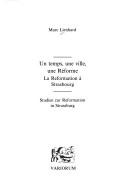
ISBN: 0860782689 Year: 1990 Volume: 319 Publisher: Aldershot ; Brookfield Gower
Abstract | Keywords | Export | Availability | Bookmark
 Loading...
Loading...Choose an application
- Reference Manager
- EndNote
- RefWorks (Direct export to RefWorks)
Christian church history --- anno 1500-1599 --- Strasbourg --- Reformation --- -Protestant Reformation --- Church history --- Counter-Reformation --- Protestantism --- History --- Strasbourg (France) --- -Church history --- -Reformation --- -Strasbourg (France) --- Protestant Reformation --- Strateburgum (France) --- Stratisburgium (France) --- Istrāsbūrg (France) --- Strassburg (Germany) --- Strasbourg (Free imperial city) --- France --- 16th century --- Strossburi (France) --- Strossburig (France) --- STRASBOURG (FRANCE) --- HISTOIRE --- REFORME --- 15E-16E SIECLES
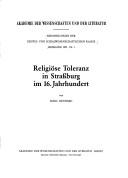
ISBN: 3515058796 9783515058797 Year: 1991 Volume: 1991,1 Publisher: Stuttgart: Steiner,
Abstract | Keywords | Export | Availability | Bookmark
 Loading...
Loading...Choose an application
- Reference Manager
- EndNote
- RefWorks (Direct export to RefWorks)
Christian church history --- anno 1500-1599 --- Strasbourg --- Religious tolerance --- History --- -Tolerance, Religious --- Toleration --- -Strasbourg (France) --- -Church history --- -Religious tolerance --- -History --- Tolerance, Religious --- Strasbourg (France) --- Strateburgum (France) --- Stratisburgium (France) --- Istrāsbūrg (France) --- Strassburg (Germany) --- Strasbourg (Free imperial city) --- Church history --- Strossburi (France) --- Strossburig (France) --- Religious tolerance - France - Strasbourg - History - 16th century.
Multi
ISBN: 9783775210225 3775210229 Year: 2007 Volume: 22 Publisher: Hannover: Hahn,
Abstract | Keywords | Export | Availability | Bookmark
 Loading...
Loading...Choose an application
- Reference Manager
- EndNote
- RefWorks (Direct export to RefWorks)
Waldenses --- Vaudois (Mouvement) --- History --- Sources --- Histoire --- Trials (Heresy) --- Strasbourg (France) --- Church history --- Valdenses --- Valdenští --- Valdesi --- Vallenses --- Vaudois --- Waldensians --- Christian sects --- Humiliati --- Heresy --- Strateburgum (France) --- Stratisburgium (France) --- Istrāsbūrg (France) --- Strassburg (Germany) --- Strasbourg (Free imperial city) --- Strossburi (France) --- Strossburig (France) --- Vaudois (mouvement) --- Persécutions --- Strasbourg (Bas-Rhin) --- 1400-1401
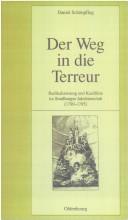
ISBN: 3486832840 3486565885 9783486832846 Year: 2002 Publisher: De Gruyter
Abstract | Keywords | Export | Availability | Bookmark
 Loading...
Loading...Choose an application
- Reference Manager
- EndNote
- RefWorks (Direct export to RefWorks)
Der Straßburger Jakobinerclub wurde im Januar 1790 gegründet und im September 1795 per Konventsdekret aufgelöst. Trotz seiner Lage an der Peripherie Frankreichs beschritt auch er den tragischen Weg, der Frankreich von der Revolution für Freiheit und Menschenrechte in die blutige Diktatur führte. Unter den spezifischen kulturellen Bedingungen des Elsaß - geprägt durch Grenzlage, Bikonfessionalität und Bilingualismus - hatte der revolutionäre Prozess dort allerdings ein ganz eigenes Gesicht. Während die enthusiastische Anfangszeit von kultureller Toleranz und Kosmopolitismus geprägt war, bildete sich nach und nach eine auf Einheitlichkeit ausgerichtete Ideologie, die mit Xenophobie, Religions- und in Ansätzen auch Sprachterror einherging. François Furet hat die Genese der Terreur durch verhängnisvolle ideologische Kontinuitäten von 1789 bis 1794 erklärt. Das vorliegende Buch greift diese These kritisch auf und zeigt zum einen, dass es neben Kontinuitäten auch nicht zu vernachlässigende Wandlungsprozesse in der revolutionären Ideologie gab, zum anderen, dass die Triebkräfte derselben in lokalen politischen und soziokulturellen Konflikten zu suchen sind.
Jacobins --- History --- Société des amis de la constitution (Strasbourg, France) --- France --- Strasbourg (France) --- Politics and government --- Strassburger Jakobinerclub --- Société des amis de la constitution de Strasbourg --- Strateburgum (France) --- Stratisburgium (France) --- Istrāsbūrg (France) --- Strassburg (Germany) --- Strasbourg (Free imperial city) --- Strossburi (France) --- Strossburig (France)
Book
ISBN: 9783446247628 3446247629 Year: 2015 Publisher: München Carl Hanser Verlag
Abstract | Keywords | Export | Availability | Bookmark
 Loading...
Loading...Choose an application
- Reference Manager
- EndNote
- RefWorks (Direct export to RefWorks)
[Die Autorin] "legt ein Erinnerungsbuch vor, das sich mit einer einzigen Strasse widmet, der unscheinbaren französischen Strasse, in der sie seit über zwanzig Jahren wohnt. ... [Sie] begegnet in ihrer Strasse der ganzen Welt im Kleinen."--Jacket.
Jews, French. --- Street life --- Authors, German --- Jewish women --- Jews, French --- French Jews --- Women, Jewish --- Women --- Honigmann, Barbara, --- Homes and haunts --- Strasbourg (France) --- Strassburg (Germany) --- Strasbourg (Free imperial city) --- Strateburgum (France) --- Stratisburgium (France) --- Istrāsbūrg (France) --- Description and travel. --- Sidewalk life --- Urban street life --- City and town life --- Honigmann, Barbara --- Strossburi (France) --- Strossburig (France)
Book
ISBN: 1789205441 9781789205442 9781789205435 1789205433 Year: 2019 Publisher: New York Oxford
Abstract | Keywords | Export | Availability | Bookmark
 Loading...
Loading...Choose an application
- Reference Manager
- EndNote
- RefWorks (Direct export to RefWorks)
Well into the 1980s, Strasbourg, France, was the site of a curious and little-noted experiment: Ungemach, a garden city dating back to the high days of eugenic experimentation that offered luxury living to couples who were deemed biologically fit and committed to contractual childbearing targets. Supported by public authorities, Ungemach aimed to accelerate human evolution by increasing procreation among eugenically selected parents. In this fascinating history, Paul-André Rosental gives an account of Ungemach's origins and its perplexing longevity. He casts a troubling light on the influence that eugenics continues to exert--even decades after being discredited as a pseudoscience--in realms as diverse as developmental psychology, postwar policymaking, and liberal-democratic ideals of personal fulfilment.
Eugenics --- Garden cities --- Cities and towns --- Greenbelts --- Homiculture --- Race improvement --- Euthenics --- Heredity --- Involuntary sterilization --- History --- Dachert, Alfred --- Political and social views. --- Jardins Ungemach (Strasbourg, France) --- Strasbourg (France) --- Strateburgum (France) --- Stratisburgium (France) --- Istrāsbūrg (France) --- Strossburi (France) --- Strossburig (France) --- Strassburg (Germany) --- Strasbourg (Free imperial city) --- Social conditions
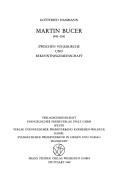
ISBN: 3515054324 9783515054324 Year: 1989 Volume: 139 Publisher: Stuttgart: Steiner,
Abstract | Keywords | Export | Availability | Bookmark
 Loading...
Loading...Choose an application
- Reference Manager
- EndNote
- RefWorks (Direct export to RefWorks)
Church --- History of doctrines --- 2 BUCER, MARTIN --- -Ecclesiastical theology --- Ecclesiology --- Theology, Ecclesiastical --- People of God --- Theology --- Godsdienst. Theologie--BUCER, MARTIN --- -Bucer, Martin --- -Contributions in doctrine of the church --- Strasbourg (France) --- -Church history --- -2 BUCER, MARTIN --- 2 BUCER, MARTIN Godsdienst. Theologie--BUCER, MARTIN --- -Godsdienst. Theologie--BUCER, MARTIN --- -Church --- Bucer, Martin, --- Bucerus, Martinus --- Strateburgum (France) --- Stratisburgium (France) --- Istrāsbūrg (France) --- Strassburg (Germany) --- Strasbourg (Free imperial city) --- Church history --- Bucer, Martin --- Reformation --- Strossburi (France) --- Strossburig (France) --- Church - History of doctrines - 16th century.
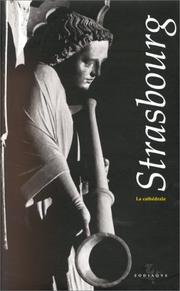
ISBN: 2736902327 9782736902322 Year: 1997 Volume: 1 Publisher: Paris: Zodiaque,
Abstract | Keywords | Export | Availability | Bookmark
 Loading...
Loading...Choose an application
- Reference Manager
- EndNote
- RefWorks (Direct export to RefWorks)
Church architecture --- Architecture, Gothic --- Architecture chrétienne --- Architecture gothique --- Cathédrale de Strasbourg --- Strasbourg (France) --- Buildings, structures, etc --- Architecture chrétienne --- Cathédrale de Strasbourg --- Cathédrale de Strasbourg. --- Cathédrale Notre-Dame de Strasbourg (France) --- Cathédrale Notre-Dame (Strasbourg, France) --- Notre-Dame de Strasbourg (Cathedral) --- Strasbourg Cathedral --- Strassburger Münster --- Pictorial works. --- Strateburgum (France) --- Stratisburgium (France) --- Istrāsbūrg (France) --- Strassburg (Germany) --- Strasbourg (Free imperial city) --- Buildings, structures, etc. --- Strossburi (France) --- Strossburig (France) --- Strasbourg (France) - Buildings, structures, etc
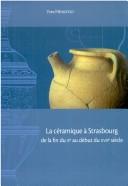
ISBN: 2902685297 Year: 2005 Publisher: Caen : Publications du CRAHM,
Abstract | Keywords | Export | Availability | Bookmark
 Loading...
Loading...Choose an application
- Reference Manager
- EndNote
- RefWorks (Direct export to RefWorks)
Pottery, Medieval --- Pottery --- Céramique médiévale --- Céramique --- Art de la céramique --- Keramische kunst --- Strasbourg (France) --- Excavations (Archaeology) --- Pottery. --- Antiquities. --- Ceramic art --- Ceramics (Art) --- Chinaware --- Crockery --- Earthenware --- Pottery, Primitive --- Ceramics --- Decorative arts --- House furnishings --- Firing (Ceramics) --- Saggers --- Archaeological digs --- Archaeological excavations --- Digs (Archaeology) --- Excavation sites (Archaeology) --- Ruins --- Sites, Excavation (Archaeology) --- Archaeology --- Strateburgum (France) --- Stratisburgium (France) --- Istrāsbūrg (France) --- Strassburg (Germany) --- Strasbourg (Free imperial city) --- Strossburi (France) --- Strossburig (France) --- Archeologie
Book
ISBN: 0804779058 9780804779050 9780804774420 0804774420 Year: 2011 Publisher: Stanford, Calif. Stanford University Press
Abstract | Keywords | Export | Availability | Bookmark
 Loading...
Loading...Choose an application
- Reference Manager
- EndNote
- RefWorks (Direct export to RefWorks)
Beyond Expulsion is a history of Jewish-Christian interactions in early modern Strasbourg, a city from which the Jews had been expelled and banned from residence in the late fourteenth century. This study shows that the Jews who remained in the Alsatian countryside continued to maintain relationships with the city and its residents in the ensuing period. During most of the sixteenth century, Jews entered Strasbourg on a daily basis, where they participated in the city's markets, litigated in its courts, and shared their knowledge of Hebrew and Judaica with Protestant Reformers. By the end of the sixteenth century, Strasbourg became an increasingly orthodox Lutheran city, and city magistrates and religious leaders sought to curtail contact between Jews and Christians. This book unearths the active Jewish participation in early modern society, traces the impact of the Reformation on local Jews, discusses the meaning of tolerance, and describes the shifting boundaries that divided Jewish and Christian communities.
Jews --- Judaism --- Christianity and other religions --- Reformation --- Protestant Reformation --- Church history --- Counter-Reformation --- Protestantism --- Brotherhood Week --- Hebrews --- Israelites --- Jewish people --- Jewry --- Judaic people --- Judaists --- Ethnology --- Religious adherents --- Semites --- History --- Relations --- Christianity. --- Judaism. --- Strasbourg (France) --- Strateburgum (France) --- Stratisburgium (France) --- Istrāsbūrg (France) --- Strassburg (Germany) --- Strasbourg (Free imperial city) --- Ethnic relations --- Strossburi (France) --- Strossburig (France) --- Christian church history --- History of Germany and Austria --- anno 1500-1599 --- anno 1600-1699 --- Strasbourg
| Listing 1 - 10 of 29 | << page >> |
Sort by
|

 Search
Search Feedback
Feedback About UniCat
About UniCat  Help
Help News
News